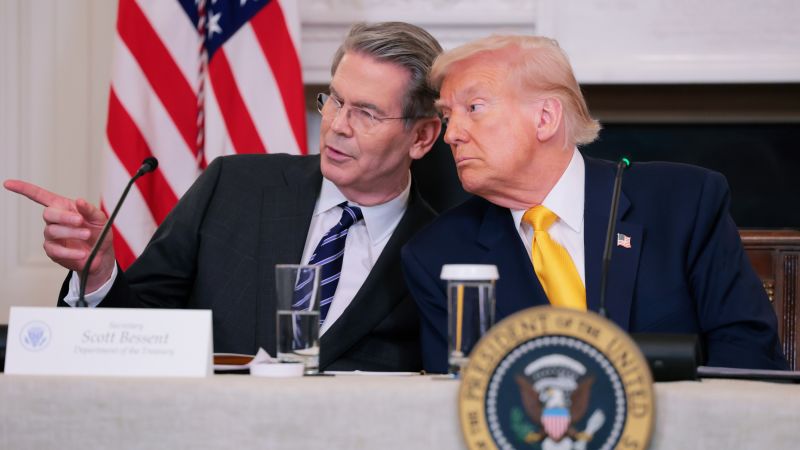As global markets reacted to President Donald Trump’s new tariffs, Treasury Secretary Scott Bessent met with Trump at Mar-a-Lago to align the administration’s messaging. Bessent emphasized focusing on the ultimate goal: securing improved trade agreements for Americans. This meeting highlights the internal debates and external pressures surrounding Trump’s trade policies, with global leaders and investors seeking clarity on the administration’s endgame.
The stakes are high, with potential market turmoil looming if clear communication isn’t established. Bessent’s intervention underscores the need for a unified approach. This article delves into the details of Bessent’s message, the reactions from global partners, and the conflicting narratives within the Trump administration regarding trade strategy. We’ll examine the potential paths forward and the implications for the American economy.
Bessent’s Mission to Mar-a-Lago
Treasury Secretary Scott Bessent’s trip to Mar-a-Lago was prompted by concerns over the lack of a clear, unified message regarding the administration’s tariff policies. Bessent aimed to convey the importance of aligning communications and emphasizing the desired outcome: better trade deals. He stressed that without a cohesive strategy, the risk of further market instability would increase. This intervention suggests a level of concern within the administration about the potential economic repercussions of the tariffs.
The meeting took place against a backdrop of scrambling by foreign leaders to understand and respond to the new tariffs. Bessent’s role as a key economic advisor highlights the importance of internal alignment in the face of external pressure. The success of Bessent’s mission will depend on whether Trump adopts a more consistent and strategic approach to trade communications.
Global Reaction and the Search for Clarity
Following Trump’s tariff announcement, delegations from numerous countries prepared to engage with U.S. officials, seeking to understand how to remove the new duties. Offers have emerged, such as the European Union’s proposal to eliminate tariffs on automobiles and industrial goods. 70 countries reached out to discuss trade concerns, illustrating the widespread impact of Trump’s policies. However, the effectiveness of these efforts remains uncertain.
Mixed signals from Trump and his economic advisors have further complicated the situation, leaving global markets and leaders uncertain about the future of trade relations. The lack of a clear path forward has created an environment of speculation and volatility, as investors and policymakers alike attempt to decipher the administration’s true intentions.
Conflicting Narratives Within the Administration
The Trump administration has presented divergent positions on trade, adding to the confusion. While Bessent emphasized the need for negotiations and better trade agreements, trade advisor Peter Navarro has maintained a firm stance against easing tariffs. This internal conflict was further highlighted by Stephen Miran, chairman of the White House Council of Economic Advisers, who acknowledged the existence of differing viewpoints within the administration.
These conflicting narratives have fueled uncertainty on Wall Street and in foreign capitals. An erroneous report about a potential pause on tariffs triggered market volatility, underscoring the sensitivity of the financial markets to any news related to trade policy. The administration’s inability to present a unified front has undermined its credibility and created opportunities for misinformation.
Trump’s Stance and the Pursuit of Fair Deals
Trump has stated his intention to secure fair and beneficial trade deals with all countries. He has also indicated a willingness to impose further tariffs if necessary. He denied any disconnect in his team’s messaging regarding the permanence of tariffs and the potential for negotiations, suggesting that both can coexist. However, this position has been met with skepticism, given the conflicting signals emanating from his administration.
Trump’s approach appears to involve leveraging the United States’ economic power to extract concessions from trading partners. Advisers have suggested that he aims to secure the best possible deals, even if it requires time and creates short-term economic disruption. The long-term success of this strategy will depend on Trump’s ability to navigate complex international relationships and maintain domestic support.
The Stakes for American Consumers and Investors
The ongoing trade disputes carry significant implications for American consumers and investors. The tariffs could lead to higher prices for imported goods, potentially impacting household budgets. Additionally, the market volatility caused by trade uncertainty could erode investor confidence and negatively affect retirement savings. Some of Trump’s wealthy supporters have voiced concerns about the tariffs, while others have adopted a wait-and-see approach.
Ultimately, the outcome of the trade negotiations will determine the extent to which American consumers and investors are affected. If Trump succeeds in securing better trade deals, the long-term benefits could outweigh the short-term costs. However, if the trade disputes escalate, the economic consequences could be severe.
Conclusion
Scott Bessent’s mission to Mar-a-Lago underscores the critical need for a clear and unified message regarding the Trump administration’s tariff policies. The global reaction to the tariffs has been one of uncertainty and a scramble for clarity, while conflicting narratives within the administration have further complicated the situation. Trump’s pursuit of fair trade deals carries significant implications for American consumers and investors, with the ultimate outcome still uncertain.
The success of Trump’s trade strategy hinges on his ability to effectively communicate his goals, navigate complex international relationships, and maintain domestic support. The coming weeks and months will be crucial in determining whether the administration can achieve its objectives and avoid a prolonged trade war. The world will be watching closely as the drama unfolds.

Leave a Reply